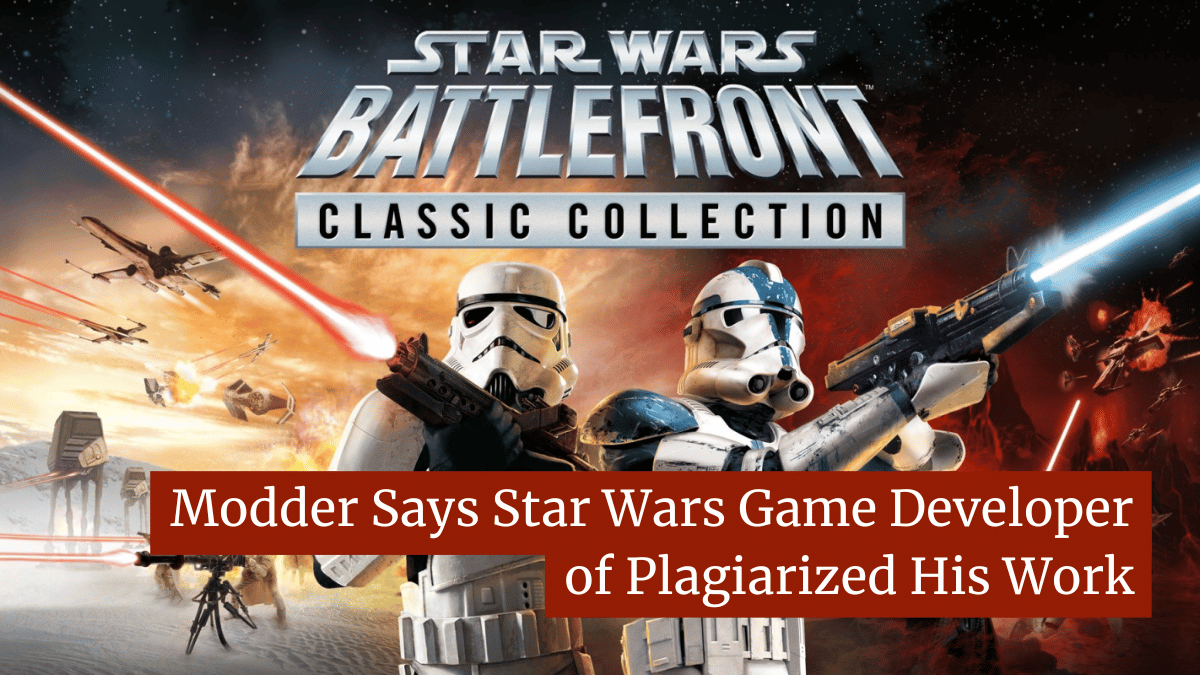Modder Says Star Wars Game Developer of Plagiarized His Work

Video game developer Aspyr is under fire from Star Wars fans for allegedly using content from a fan-made mod in their recent rerelease of two classic Star Wars games, adding fuel to the already significant backlash to the title itself.
This has been especially problematic since the issue was pointed out last month with the launch of a trailer for the game, and the company responded by promising that no “uncredited” content would be appearing in the final game.
But, while certain elements were removed, users who dug deeper into the game files after release found more evidence of uncredited copying from the modder. That content has since been removed with additional updates.
The game, Star Wars: Battlefront Classic Collection, was meant to be a return to form for the Battlefront series. After a series of divisive modern releases, many fans were looking forward to revisiting the classic Star Wars Battlefront and Star Wars Battlefront II, which were released in 2004 and 2005, respectively.
However, that release has not gone to plan, with the game receiving “Overwhelmingly Negative” reviews on Steam and a 2.8 user score on Metacritic. Users have complained about bugs, networking issues, and generally seeming unfinished.
To that end, these recurring allegations of plagiarism have not helped the game or the studio behind it, raising questions about how much respect it has for the fans that loved the originals.
The Story So Far
In 2004 and 2005, Pandemic Studios developed and released both Star Wars Battlefront and Star Wars Battlefront II. Both games went onto to be well received by critics and fans alike, becoming commercial successes.
However, a pair of more modern reboots of the game, released in 2015 and 2017 respectively, did not fare as well. Generally underperforming in both sales and reviews. The 2017 version of Star Wars Battlefront II was especially derided for its heavy use of loot box and other gambling mechanics.
On February 21, 2024, Aspyr games and Lucasfilm announced that they would be releasing Star Wars: Battlefront Classic Collection, a re-release of the first two games for modern consoles and PCs. The announcement was made at the Nintendo Direct event with a launch trailer.
However, viewers of the trailer noticed something interesting, that two of the characters featured in the video did not appear to be taken from previously released content, but from content created by a modder.
The original Battlefront 2 had a DLC pack that added two new heroes, Kit Fisto and Asajj Ventress. However, that DLC was exclusive to the Xbox and was never released for the PC. While many were hoping that meant the DLC would finally get ported to PC, an examination found that the models came not from the original material, but from a 2021 mod released by a modder named iamashaymin, who had reskinned other characters to get the heroes in the game.
That mod, which is available for free on ModDB, featured notably different models and animations to the Xbox version.
This forced a response from Aspyr, who apologized for the issue, saying that it had accidentally included “content that is not the product” for the trailer. They went on to say that there would be no code or content taken from “uncredited sources.”
However, after the game’s release on March 14, it didn’t take long for the modding community to learn that wasn’t true.
In a post on X (formerly Twitter), iamashaymin highlighted that, in the Nintendo Switch version “launched with just straight up all my hero stuff from my mod. Same glitches and bugs.”
He goes on to add that he examined the files and found that they were the same ones he had worked on in 2020 and released in 2021.
Aspyr has not responded to the new allegations. However, the animations and files have been removed in a recent patch to the game.
The reveal has thrown more fuel on the backlash against the game, which has received significant criticism for its pricing, large file size, bugs, networking issues and other problems.
In short, even though the story is most likely over, it does not mean that the modding community nor the fans will forget this any time soon.
The Complexities of Modding
The relationship between modders and game developers has long been a fraught one.
Modders look at what they do as the ultimate labor of love. They spend countless hours working on mods for video games knowing that they will never receive any compensation for it other than love from the modding community.
However, part of that love from the modding community is from an intense fervor when it comes to attribution and citation, with modders receiving credit for their contributions, wherever they may be.
Though some modders have gone on to get jobs in the video game industry, they generally see modding as a selfless act that expands, extends, and adds to the games they work on.
Developers, however, have had a wide variety of responses to that professed love. Some, most notably Capcom, have likened modding to cheating, saying that it enables tampering with the game and the intended experience.
Most, however, seem to take a more favorable approach. They either tacitly allow modding to take place, especially in single player games or modes, while others openly and actively encourage modding, creating tools to make modding easier.
Those that have allowed or encouraged modding have often been rewarded for it. Many of the best-loved games such as Defense of the Ancients (DOTA), Counter-Strike, Team Fortress Classic, DayZ, PlayerUnknown’s Battlegrounds (PUBG) and more all began life as a mod of another game.
However, that does not mean that the relationship between modders and developers has not been fraught. The modding community has made it clear that their craft is one that they do for love and not for money. This often clashes with the very commercial nature of the video game industry.
For example, in April 2015, Valve announced that it was launching a platform to allow modders to sell their products on their Steam platform. However, that announcement was almost immediately met with backlash from the modding community, forcing Valve and partner Bethesda to backtrack on the project.
In that context, it is easy to see why this plagiarism stings the modding community as badly as it does. Modders have spent countless hours creating mods that are often complete games unto themselves, all the while strongly eschewing financial gain for those efforts. To then have parts of such a mod repackaged and released in commercial product without attribution or acknowledgement, is an incredible slap in the face.
However, judging from the reviews and backlash to the release, it is just one slap among many.
Bottom Line
From a legal standpoint, there is not likely a great deal that iamashaymin can or would likely do. Though he would own the copyright to any original work he had created, given that his work is a derivative work both of Star Wars and the original game, that boundary is going to be fuzzy and difficult to prove.
Given that the game is doing poorly, and that the material has already been removed, even if the battle can be won, it is not likely to be one worth fighting.
Instead, this is a case where the ethical aspects of plagiarism and copyright really come into focus. On one side, you have a community that eschews commercialization of their product but is very heavy on attribution and credit. On the other, you have an industry that is completely about commercialization and whose history with attribution is dubious at best.
That industry just took modding code, used it in a commercial product and did not provide any attribution or credit. It is literally counter to everything the modding community has stood for.
It should come as no surprise to anyone involved that the fans are upset and saying that this breaks any trust that they had in Aspyr. It is a tremendous breach of trust, an exploitation of fans’ devotion to the original games and strong evidence that the company does not understand or respect that devotion.
Even if this scandal does not stick around long, become a legal battle, or otherwise have any long-term impacts, it is a worrying sign for the relationship between modders and developers.
It has always been a complicated relationship, but it just got that much more difficult.
Want to Reuse or Republish this Content?
If you want to feature this article in your site, classroom or elsewhere, just let us know! We usually grant permission within 24 hours.
